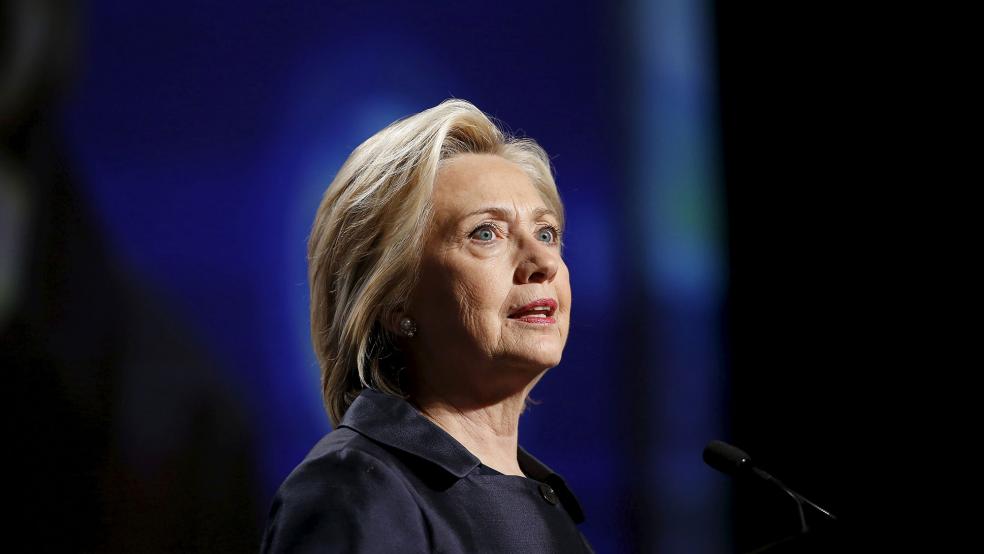A new survey shows Hillary Clinton with a lock on 75 percent of the Democratic primary vote. Her nearest rival – independent Sen. Bernie Sanders – has picked up a little steam but still is able to claim only 15 percent support among likely voters in next year’s primary contest.
The Wall Street Journal/NBC News poll released late Monday also highlights Clinton’s formidable strength among Hispanic voters and women under the age of 50 who are likely to tip the balance in a close presidential election in November 2016. The former first lady was the first choice of 71 percent of liberals and an impressive 91 percent of non-whites, according to the survey conducted June 14-18.
Related: Where Clinton, Sanders and O’Malley Stand on the Issues
While numerous previous surveys have revealed voter distrust about Clinton’s character and honesty based on the millions of dollars that she and her husband former president Bill Clinton have amassed since they left the White House and her dubious decision to use her personal email account in communicating while at the State Department, some 92 percent of Democratic primary voters say they could see supporting her while only 8 percent said they couldn’t.
Her appeal among Hispanics and other non-white voters is perhaps most telling about her prospects for success in a fall campaign because of the Republican Party’s failure to win the past two presidential elections largely because of the disaffection of Hispanic voters. While the new Wall Street Journal/NBC poll shows that American voters are practically evenly divided on whether they want President Obama’s successor to be a Democrat or Republican, Latinos favor a Democrat over a Republican by nine percentage points.
Yet the disparity is even greater.
Former Florida governor Jeb Bush, who speaks fluent Spanish and is married to a Mexican-American, and Sen. Marco Rubio (R-FL), the son of two Cuban refugees, are often touted as the Republicans’ best prospects for bringing Hispanic voters back into the GOP fold. But among likely Hispanic voters, Clinton holds on average a 42 point advantage over Bush and Rubio, according to the poll.
Related: Bush’s ‘General Election Strategy’ May be Working
Moreover, in hypothetical general election matchups, Clinton leads Bush, 48 percent to 40 percent, and her lead grows to 10 percentage points in a matchup with Rubio.
While many Hispanic voters are disenchanted or angered over the Republicans’ steadfast opposition to Obama’s executive orders to protect millions of illegal immigrants from deportation, Clinton in recent months has made a major play for Hispanic support with promises of liberalized immigration laws – including a pathway to full legal status or citizenship for many undocumented immigrants from Mexico and Central America.
During a speech in Las Vegas in early May, Clinton promised to “do everything I possibly can” to help illegal immigrants, including going beyond Obama’s executive orders -- which are currently caught up in a legal challenge – to protect illegal immigrants. “This is where I differ from everybody on the Republican side. Make no mistake. Today, not a single Republican candidate – announced or potential – is clearly and consistently supporting a path to citizenship.”
Related: Clinton vs. Bush—Who Had the Better Speech?
Bush’s stand on immigration reform has evolved over the last couple of years, but currently he favors only a path to legal status for millions of undocumented aliens to live and work in the U.S. Rubio made comprehensive immigration reform the cornerstone of his legislative and was a key player in passing legislation in the Senate two years ago that both strengthened security along the U.S.-Mexican border and provided a long-term path to citizenship for many illegal immigrants. Since then, he has disavowed the legislation in the face of bitter criticism from conservatives and is advocating a more piecemeal approach to reforms and enhanced border security.
While both Bush and Rubio have enjoyed substantial Hispanic support in their home state of Florida, neither politician has generated major excitement among Latinos nationally. According to two Washington Post/ABC News polls conducted earlier this year by Langer Research Associates, the former Florida governor trailed Clinton with registered Hispanic voters 71 percent to 26 percent, or nearly the same 3 to 1 margin by which Hispanics supported Obama over Republican challenger Mitt Romney in 2012.
Rubio doesn’t do any better. Research last year by Latino Decisions, an Hispanic research and polling organization, only 31 percent of 4,200 Latinos who were interviewed had a favorable view of Rubio. Part of Rubio’s problem is that while he is the darling of Florida’s sizable Cuban-American community, that doesn’t translate into support among Hispanics from Mexico and Latin America.
While two-thirds of the nation’s 1.8 million Cuban-Americans live in Florida, they constitute just 3.3 percent of the 54 million Hispanics in the U.S., Census data show – many of whom are not qualified to vote either because they are here illegally or are children. Rubio might argue, however, that in another tight presidential race that comes down to the outcome in electoral vote-rich Florida, his extreme popularity among Cuban Americans there might give him a critical edge.
The poll of 1,000 adults – using both cell phones and land lines – has a margin of error of plus or minus 6.38 percent for Republican respondents and plus or minus 6.24 percent for Democrats. The findings reflect a number of other earlier polls showing Clinton making a much stronger showing among Hispanics than her Republican rivals.
Top Reads from The Fiscal Times:





